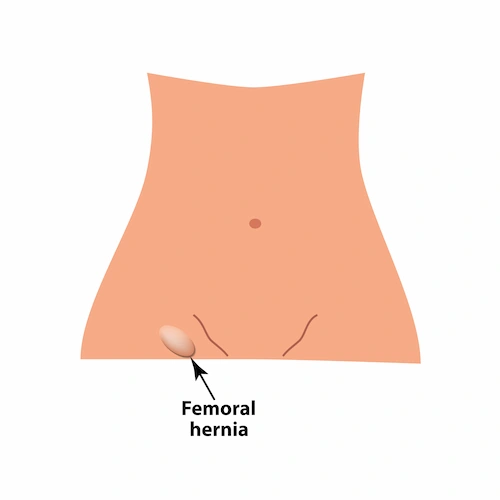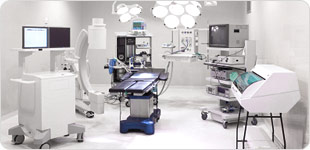Femoral Hernia

A protrusion into the groin or upper thigh.
The hernia specialists at Hernia Center Los Angeles routinely treat femoral hernias. Our hernia surgeons are widely recognized for their exceptional skill and commitment to providing our patients with comprehensive and personalized care.
- What is a Femoral Hernia?
- Femoral Hernia Causes
- Symptoms of a Femoral Hernia
- Preparing for Femoral Hernia Surgery
- Femoral Hernia Treatment
- Recovery After Femoral Hernia Surgery
- Frequently Asked Questions About Femoral Hernias
What is a Femoral Hernia?
A femoral hernia is a type of hernia that occurs in the groin area, just below the crease where the thigh meets the torso. It is caused by a weak spot in the abdominal wall, which allows tissue or organs to push through the muscle and into the femoral canal. This canal contains the femoral artery, femoral vein, and nerve, which supply blood and sensation to the leg.
Femoral hernias, sometimes referred to as groin hernias, are more common in women than men, and have a higher incidence in people over the age of 50.

Femoral Hernia Causes
Possible causes of a femoral hernia include:
- Chronic coughing
- Chronic constipation
- Heavy lifting
- Obesity
- Straining to urinate (as a result of an enlarged prostate)1
In many cases, it is not possible to distinguish the cause of a femoral hernia. There are, however, some factors that put people at a higher risk for developing a femoral hernia, such as:
- Age
- Pregnancy
- Connective tissue disorders
- Cystic fibrosis2
Symptoms of a Femoral Hernia
The most common symptom of a femoral hernia is a bulge or swelling in the groin area, which is often more noticeable when coughing or standing. The bulge or protrusion may be tender to the touch and may disappear when lying down. Other symptoms of a femoral hernia may include:
- Pain in the groin area, often more noticeable when heavy objects or bending over
- Aching or burning sensation in the groin area or lower abdomen
- Nausea or vomiting
- Difficulty passing urine or bowel movements
In rare cases, a femoral hernia may become incarcerated, meaning that the protruding tissue becomes trapped in the femoral canal and cannot be pushed back into the abdominal cavity. This is a complex hernia that can lead to severe pain and swelling in the groin area, and it may require emergency surgery to prevent damage to the tissue or organs.
Preparing for Femoral Hernia Surgery
The most important step in preparing for femoral hernia surgery is to attend a consultation with a hernia doctor from Hernia Center Los Angeles. During this appointment, the surgeon will conduct a brief physical examination and review of your medical history, then explain the details of your hernia surgery procedure. You will also be given detailed instructions and expectations about preparing for hernia surgery and the recovery period.
Femoral Hernia Treatment
The primary treatment for a femoral hernia is surgery to repair the weakness in the abdominal wall and prevent a strangulated hernia, bowel obstruction, or hernia recurrence. Our expert surgeons perform small incision, open surgery to repair femoral hernias, as this reduces the risk of complications and hernia recurrence.
Femoral hernia surgery is an outpatient procedure performed under general anesthesia. To begin femoral hernia repair surgery, the surgeon makes a small incision in the lower abdomen or groin area and pushes the protruding hernia sac back into the abdominal cavity. The abdominal wall is then reinforced, sometimes with a mesh patch, to prevent the hernia from recurring. The incision is closed with sutures or staples.
Recovery After Femoral Hernia Surgery
Recovery after femoral hernia surgery can vary depending on the type of surgery performed and the individual patient's health status. In general, you can expect to experience some pain and discomfort in the groin area for several days after surgery, which can be managed with pain medications.
Your hernia doctor will instruct you to restrict your activities for several weeks after surgery to allow the abdominal wall to heal properly. This may include avoiding heavy lifting, strenuous exercise, and driving for several weeks. It is important to follow your surgeon's instructions regarding wound care, including keeping the incision area clean and dry until the incision has fully healed.
Most patients are able to return to work and normal activities within a few weeks of surgery, but it may take several months for the incision area to fully heal and to regain full strength and mobility.
Frequently Asked Questions About Femoral Hernias
How is a femoral hernia diagnosed?
A femoral hernia is typically diagnosed through a physical exam and medical history. The doctor will look for a bulge or swelling in the groin area and may ask the patient to cough or strain to see if the bulge becomes more noticeable. Imaging tests such as ultrasound, X-ray, or CT scan may be used to confirm the diagnosis.
Is surgery the only treatment for a femoral hernia?
Surgical repair is the primary treatment for a femoral hernia, as it is the only way to repair the weakness in the abdominal wall and prevent the hernia from recurring. However, in some cases, a watchful waiting approach may be recommended for patients who have a small, asymptomatic hernia that is not causing any complications.
What are the risks of femoral hernia surgery?
Like any surgery, femoral hernia surgery carries some risks, including bleeding, wound infection, and damage to surrounding tissues or organs. There is also a risk of the hernia recurring after surgery, although this risk is generally low with modern surgical techniques.
Can a femoral hernia be prevented?
While it may not be possible to prevent all femoral hernias, there are some steps that can be taken to reduce the risk of developing one. Maintaining a healthy weight, avoiding smoking, and avoiding activities that strain the abdominal muscles (such as heavy lifting) can all help reduce the risk of developing a hernia. It is also important to seek prompt medical attention if you notice any symptoms of a hernia, as early diagnosis and treatment can help prevent complications.3
Contact Us
If you have been diagnosed with a femoral hernia, contact the experts at Hernia Center Los Angeles to learn more about your treatment options.
1 National Library of Medicine. Femoral Hernia. Available: https://medlineplus.gov/ency/article/001136.htm. Accessed March 31, 2023.2 Cleveland Clinic. Hernia. Available: https://my.clevelandclinic.org/health/diseases/15757-hernia#management-and-treatment. Accessed March 31, 2023.
3 Mount Sinai. Femoral Hernia. Available: https://www.mountsinai.org/health-library/diseases-conditions/femoral-hernia. Accessed March 31, 2023.



